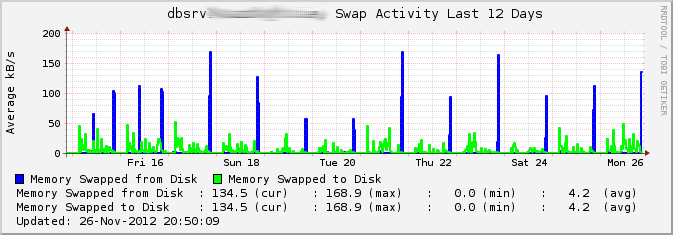Shared Memory and Swapping
Christoph Berg
We have this PostgreSQL server with plenty of RAM that is still using some of its swap over the day (up to 600MB). Then suddenly everything is swapped in again.

It turned out the reason is there are two clusters running, and the second one isn’t used as heavily as the first one. Disk I/O activity of the first cluster slowly evicts pages from the second shared buffers cache to swap, and then the daily pg_dump run reads them back every evening.
I was not aware of an easy way to get numbers for “amount of SysV shared memory swapped to disk”, but some googling led to shmctl(2):
#define _GNU_SOURCE 1
#include <sys/ipc.h>
#include <sys/shm.h>
#include <stdio.h>
#include <unistd.h>
int main ()
{
struct shm_info info;
int max;
long PAGE_SIZE = sysconf(_SC_PAGESIZE);
max = shmctl(0, SHM_INFO, (struct shmid_ds *) &info);
printf ("max: %d\nshm_tot: %ld\nshm_rss: %ld\nshm_swp: %ld\n",
max,
info.shm_tot * PAGE_SIZE,
info.shm_rss * PAGE_SIZE,
info.shm_swp * PAGE_SIZE);
return 0;
}
The output looks like this:
max: 13 shm_tot: 13232308224 shm_rss: 12626661376 shm_swp: 601616384
Update: Mark points out that ipcs -mu shows the same information. Thanks for the hint!
# ipcs -mu ------ Shared Memory Status -------- segments allocated 2 pages allocated 3230544 pages resident 3177975 pages swapped 51585 Swap performance: 0 attempts 0 successes